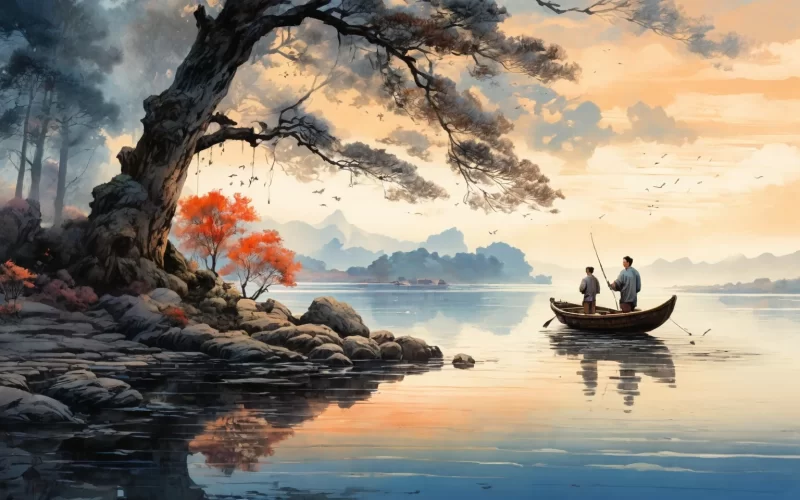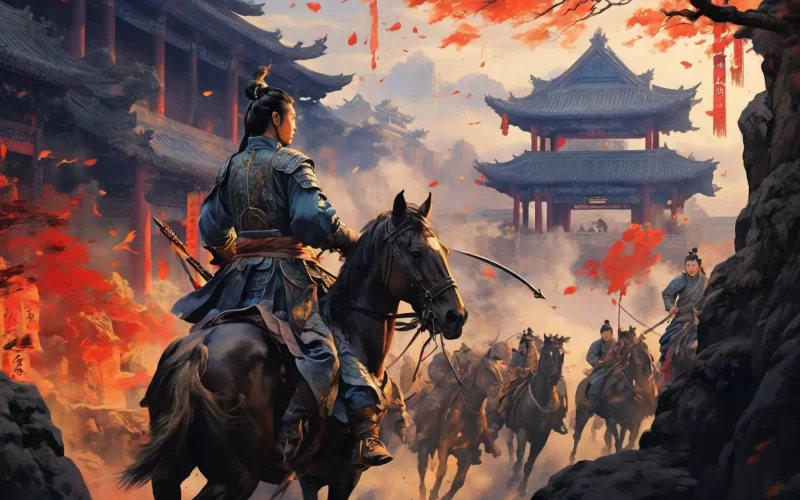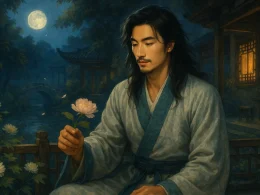Stone-Fish Lake is like Lake Dongting --
When the top of Zun is green and the summer tide is rising.
...With the mountain for a table, and the lake a fount of wine,
The tipplers all are settled along the sandy shore.
Though a stiff wind for days has roughened the water,
Wine-boats constantly arrive...
I have a long-necked gourd and, happy on Ba Island,
I am pouring a drink in every direction doing away with care.
Original Poem
「石鱼湖上醉歌」
元结
石鱼湖,似洞庭,夏水欲满君山青。
山为樽,水为沼,酒徒历历坐洲鸟。
长风连日作大浪, 不能废人运酒舫。
我持长瓢坐巴丘, 酌饮四座以散愁。
Interpretation
This poem was likely composed during the Dali era of Emperor Daizong of Tang, when Yuan Jie served as the prefect of Daozhou. Though living in relative leisure, his contemplative nature often found solace in landscapes. During his tenure, he frequented the Stone Fish Lake, describing its unique scenery in the "Preface to Stone Fish Lake" with evident affection—noting how "wine cups rest upon fish backs, encircled by lake waters." He even named the lake and inscribed its rocks to commemorate his visits. "Drunken Song on Stone Fish Lake" captures his reflections during lakeside revelry, where surface depictions of drinking veil deeper frustrations over career stagnation and unfulfilled ideals—a quintessential example of his "voicing aspirations through intoxication" and "expressing emotion through scenery."
First Couplet: "石鱼湖,似洞庭,夏水欲满君山青。"
Shí yú hú, sì Dòngtíng, xià shuǐ yù mǎn Jūnshān qīng.
Stone Fish Lake mirrors Dongting’s sweep—
Summer swells near flood the banks,
While Junshan’s emerald peaks stand deep.
The poem opens with a bold analogy, elevating the modest lake to the grandeur of Dongting. This hyperbolic comparison ("mirrors Dongting’s sweep") transcends mere description, revealing the poet’s emotional magnification of the landscape. The swelling summer waters and verdant distant hills fuse external observation with internal expansiveness—a small lake transformed into a universe within the poet’s heart.
Second Couplet: "山为樽,水为沼,酒徒历历坐洲鸟。"
Shān wéi zūn, shuǐ wéi zhǎo, jiǔ tú lìlì zuò zhōu niǎo.
Mountains for wine cups, lakes for vats,
Drinkers perch on isles like roosting birds.
Here, the drinking scene unfolds with unrestrained lyricism. The metaphorical "mountains for wine cups" and "lakes for vats" dissolve boundaries between human revelry and natural vastness, embodying a romantic fusion with the cosmos. The drinkers ("perch on isles like roosting birds") suggest both spontaneous gathering and transient existence—a fleeting yet vivid tableau of communal abandon.
Third Couplet: "长风连日作大浪,不能废人运酒舫。"
Cháng fēng lián rì zuò dà làng, bùnéng fèi rén yùn jiǔ fǎng.
Though gales churn waves day after day,
They cannot halt our wine boats’ way.
Beyond chronicling weather obstructions, these lines articulate defiance. The unceasing gales and towering waves ("churn waves day after day") mirror societal turbulence, yet the unimpeded wine boats ("cannot halt our wine boats’ way") symbolize perseverance. The couplet thus becomes an allegory of sustaining joy and purpose amid adversity—a quiet manifesto of resilience.
Fourth Couplet: "我持长瓢坐巴丘,酌饮四座以散愁。"
Wǒ chí zhǎng piáo zuò Bāqiū, zhuó yǐn sìzuò yǐ sàn chóu.
Ladle in hand on Baqiu’s rise,
I serve all seats to drown my sighs.
The finale unveils the poem’s core tension. The ceremonial act of serving wine ("ladle in hand") masks deeper melancholy, where communal cheer ("serve all seats") clashes with private sorrow ("to drown my sighs"). The "sighs"—untranslatable in their layered sigh—compress career disillusionment, societal critique, and the scholar-official’s eternal conflict between idealism and reality. The drinking ritual, for all its exuberance, becomes an exorcism of unspoken grief.
Holistic Appreciation
Set against a backdrop of mountains and waters, with wine as its medium, the poem presents a vivid scene while subtly conveying profound emotions. Behind the apparent revelry lies the poet's deep lament and existential anguish. As a regional governor, he keenly perceives the corruption of court politics and the hardships of the people. Though burdened with concern for his country and its citizens, he finds no outlet for his ideals, turning instead to nature for solace and wine to drown his sorrows. The language is unadorned yet sincere, grand in spirit. Scenes are imbued with emotion, and emotions conceal aspirations—rendered with both unrestrained vigor and contemplative depth. This is a masterful work where scene and sentiment merge, using drunkenness as a vehicle for expression.
Artistic Merits
- Emotion Through Scene, Blending Real and Imagined: While depicting lakeside drinking, the poem subtly conveys the poet’s lament over unfulfilled ambitions, seamlessly merging reality with introspection.
- Plain Style, Lofty Sentiment: The straightforward, unembellished language creates vivid imagery and emotional tension, embodying Yuan Jie’s characteristic "poetics of simplicity."
- Romantic Exaggeration and Lyrical Flourish: Lines like "mountains as wine cups, waters as marshes" expand natural imagery into grand metaphors, infusing the landscape with a romantic, almost mythic quality.
- Profound Emotion, Veiled Protest: Though ostensibly about revelry, the true theme is "dispelling sorrow." Wine serves both as an anesthetic and a form of resistance—a way to confront injustice without surrender.
Insights
This poem offers more than just the joy of nature and wine; it reveals a scholar’s composure and resilience in the face of political turmoil and personal setbacks. The poet does not truly lose himself in landscapes or intoxication but seeks fleeting solace in them. Wine becomes a medium to voice his disillusionment with reality. The poem reminds us: life is often unkind, yet we must preserve our spiritual integrity and freedom even in adversity. Whether through a cup of clear wine or a misty lake, we can always carve out a sanctuary for the soul.
Poem translator
Kiang Kanghu
About the poet
Yuan Jie (元结, 719 - 772), a native of Lushan in Henan province, was a Mid-Tang poet and pioneer of the Classical Prose Movement. He earned his jinshi degree in 753 during the Tianbao era. His poetry, deeply concerned with the suffering of common people and opposed to ornate literary styles, aligns with the spirit of Yuan Zhen and Bai Juyi's New Yuefu movement. Regarded as a seminal figure in Mid-Tang realist poetry, his works bridge early social critique with the later populism of the "Yuan-Bai School."












